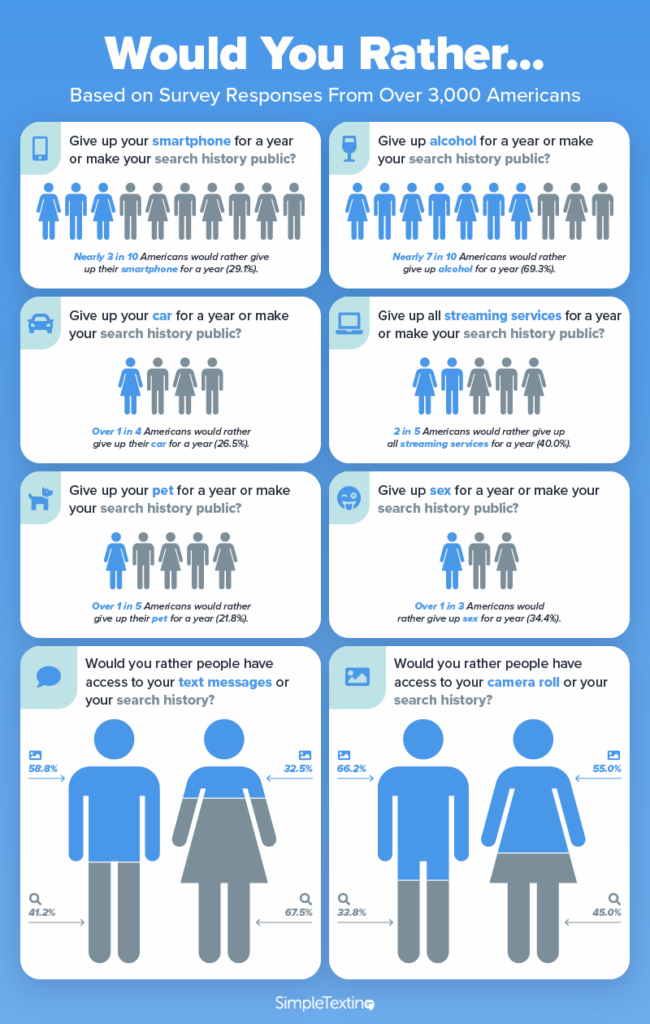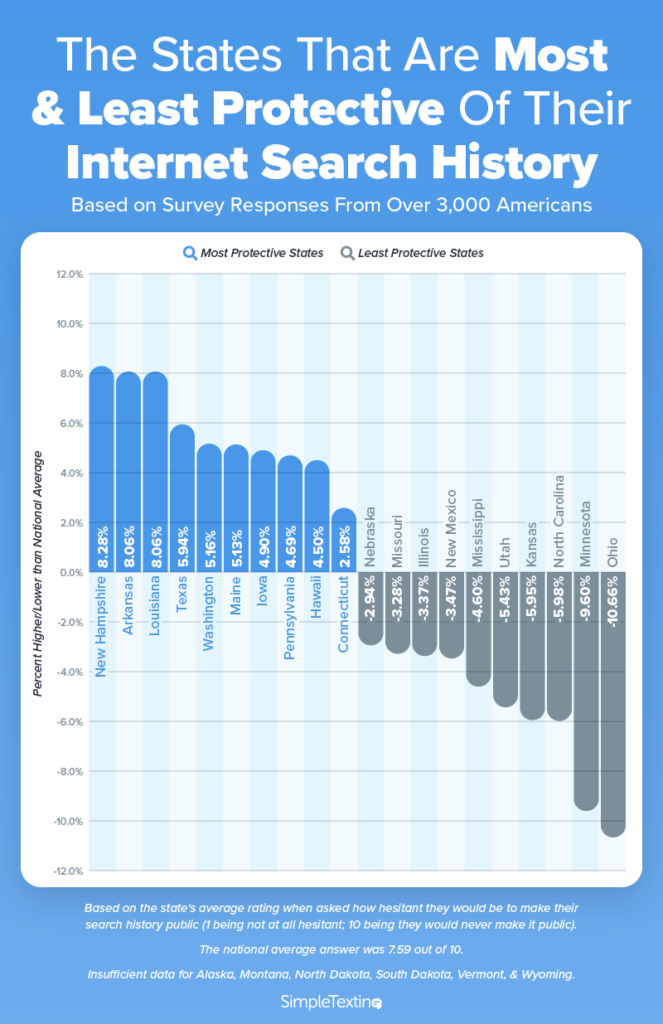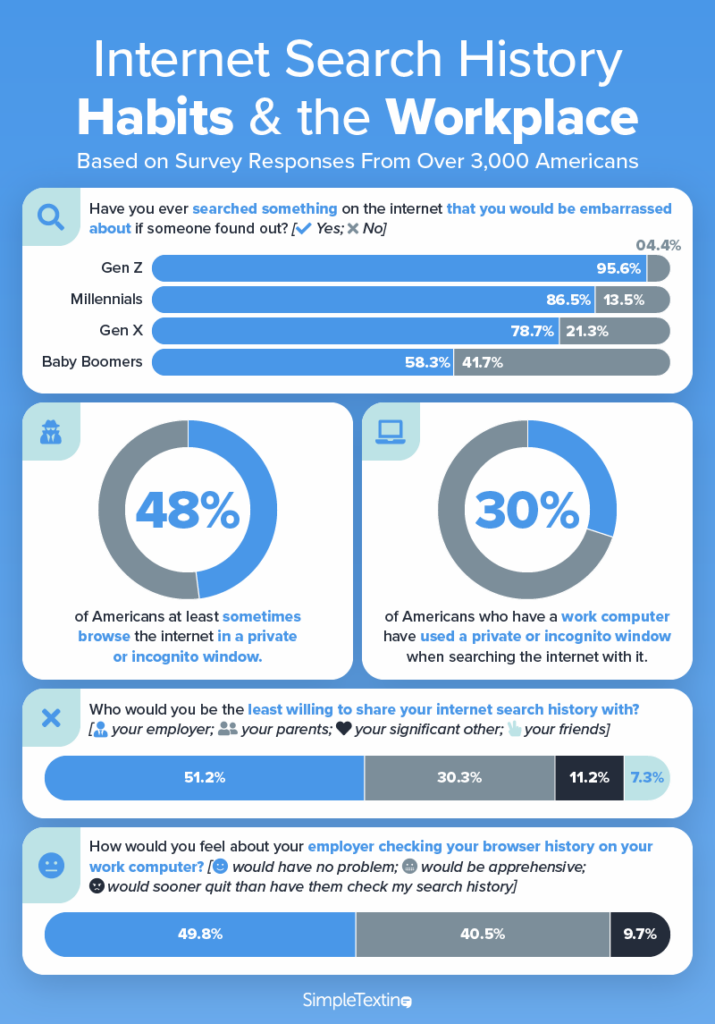How far would you go to keep your search history private?
How concerned are Americans if their private Google searches become public? We surveyed over 3,000 participants across the country to find out.

How concerned are Americans if their private Google searches become public? We surveyed over 3,000 participants across the country to find out.

With the average person conducting three to four Google searches per day, we were curious how many Americans would feel comfortable exposing their innermost searches to the world. Chances are you have searched “how to make your search history private”, or perhaps you are cool as a cucumber at the thought of your boss and your mom knowing which Subreddits you read in your free time.
We wanted to get to the bottom of the debate, which is why we surveyed over 3,000 participants across the country and analyzed their answers by state, gender, and generation to determine who leans in which direction. Read on to discover who is most likely to send out an SOS should their search history ever be revealed.
We surveyed over 3,000 participants in the U.S. to find out how far Americans would go to keep their search history private. Our survey ran for over a week in April 2022, and we asked participants questions about how protective they are of their search history, how they would feel about their employers knowing what they search for, what they would give up to ensure it stays private, and other revealing ‘would you rather’ style questions.
To find out who is busy googling, “How to make your search history private?” read on!

There is no sacrifice too small when it comes to Americans’ desires to protect their search history. Americans take their search history seriously, as 3 in 10 people would rather give up their smartphone for a year than make their history public.
Fluffy the cat is not even safe, as 20% of participants would rather give up their pet for a year than reveal their private search history. Millennials have been shamed for their image-obsessed behaviors in the past, but perhaps most Americans are concerned with how their personal brand would change if their private Google searches got out.
Perhaps the biggest indicators of our reluctance to share our internet browsing history are the number of Americans who would rather give up alcohol for a year (69%) or give up sex for a year (34%) than have their private Google searches made public.
Interestingly, we found that 58.76% of men would rather have people access their text messages instead of their search history, while 32.52% of women would be open to someone viewing their texts instead of their search history.

There are a few concessions Americans are willing to make to reveal their search history. 69% of Americans would not share their search history with their parents if asked, but honestly, some boundaries are not made to be broken.
15% of Americans would not share their search history to win their dream home. And for the win, it would take over $5.5 million for the average participant to make their search history public, which just goes to show how potentially ruinous it would be for people to share their private Google searches with the world.

To begin, we asked residents from every U.S. state one question: on a scale of 1 to 10, how hesitant would you be to make your internet search history public? (1 being not at all hesitant, 10 being they would never share their internet search history). The national average for this question was 7.59 out of 10.
New Hampshire had no shame in revealing that they were the most protective over their search history with a hesitancy rating of 8.22 out of 10. The state does have laws in place protecting their online right to privacy, perhaps putting residents at ease.
Southern states, Arkansas and Louisiana, tied for second, while Texas ranked third. The south, stereotyped for championing their constitutional rights and freedoms might be uncomfortable with big tech looking over their shoulders and being tracked by large platforms.
On the flip side, Ohio had little to hide with a rating of 6.78 out of 10, differentiating it from the national average by -10.66%. Even though there are more wireless phones than people in Ohio, making their private Google searches public doesn’t seem like a big cause for concern.
Minnesota and North Carolina follow closely behind and are less worried about how to hide search history than most other states. Perhaps, they are too busy tweeting and sharing cute dog videos on Facebook to look up from their phones.

When it comes to Americans’ search history, we discovered some startling insights. We found that the younger the generation, the more likely they were to be embarrassed if someone read their past search results.
58.3% of baby boomers answered yes when asked if they have ever searched something on the internet that would be embarrassing if someone found out while 95.6% of Gen-Zers reported saying yes to the same question, a whopping 37.3% gap between generations. It makes sense as 98% of Gen-Zers own smartphones and spend over five hours a day on them.
More than half of the participants (51.2%) reported that they would be least willing to share their internet search history with their employer. Of course, no one wants to be caught appearing unproductive in front of their boss, but it might be a good chance to segway into the four-day workweek conversation.
If worse came to worst, 9.7% of participants would rather quit than let their boss take a peek at their private Google searches, showcasing the deep anxiety attached to private information. We won’t speculate as to why, but if you spent all of your time binging Netflix’s The Social Dilemma instead of working—then we might help you get started on that resignation.
In this ultra-connected world, most of us want to hide search history to no fault of our own. With the ability to access the internet in the palm of our hands and a track record that shows which sites we’ve visited, it’s no wonder that Americans feel indignant about their search history staying far away from prying eyes.
Privacy is a key factor to us here at SimpleTexting, which is why we always get permission to text customers via SMS opt-ins when sending mass texts. This way, your customer base will feel secure and it will help you and your audience to connect.
Dani Henion is the content team lead at SimpleTexting and is continuously looking for ways to make text messaging strategies and tips more accessible to SMBs. When she's not writing or planning new SMS content, you'll find her decorating elaborate sugar cookies or thrifting in Atlanta.
More Posts from Dani HenionLearn how to write email marketing subject lines your audience can't resist with these tips, AI prompts, and real-life examples.
ReadWith a delivery rate of 98%, SMS is one of the most reliable forms of communication. Here’s everything you need to know about text message reliability and how to measure it.
ReadStart a text marketing campaign or have a 1-on-1 conversation today. It's risk free. Sign up for a free 14-day trial today to see SimpleTexting in action.
No credit card required